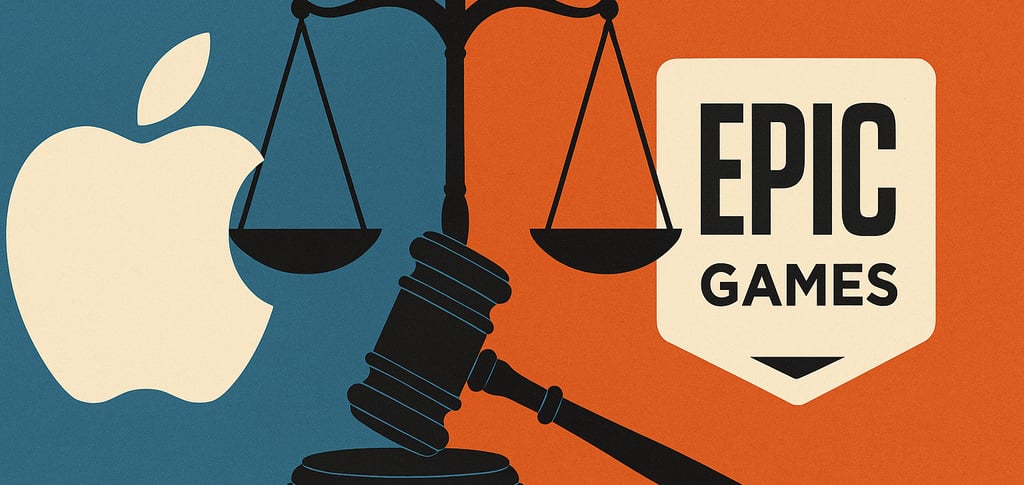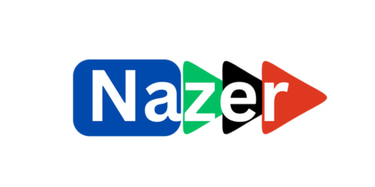The Epic Games vs. Apple Legal Battle: A Turning Point in Mobile App Distribution and Payments
Epic Games and Apple’s legal battle centers on app store policies, payment fees, and anti-competitive practices. Recent court rulings challenge Apple's control, potentially reshaping digital marketplaces and app distribution.
5/6/20256 min read


The ongoing legal dispute between Epic Games and Apple has become one of the most high-profile cases in the tech industry, raising questions about app store practices, in-app purchases, and monopolistic behavior. What started as a disagreement over Fortnite's removal from the iOS App Store has since evolved into a broader battle over the future of digital marketplaces, with serious consequences for both companies and the mobile app industry as a whole.
This article provides a comprehensive overview of the dispute between Epic Games and Apple, the legal developments that have shaped the case, and the implications for developers, consumers, and the tech industry.
The Genesis of the Dispute: Epic Games and Apple's App Store Policies
The legal battle between Epic Games and Apple began in August 2020, when Epic Games, the creator of the wildly popular game Fortnite, introduced a direct payment system within the app, bypassing the App Store’s payment system. By doing so, Epic Games was attempting to avoid paying Apple’s 30% commission fee on in-app purchases, which is standard for most developers using the iOS App Store.
Epic Games made this move in protest of Apple’s App Store policies, which the company claimed were monopolistic and anti-competitive. Under Apple’s guidelines, all iOS apps must use Apple’s payment system, which takes a 30% cut of transactions. Epic Games, however, argued that the commission was excessive, particularly for in-app purchases that are not directly related to the cost of the app itself. As a result, Epic Games introduced a "Hotfix" that allowed users to pay directly through Epic Games’ payment system, offering a 20% discount for using this alternative method.
Apple’s response was swift and severe. Within hours of Epic’s move, Apple removed Fortnite from the App Store for violating its policies. Epic Games, in turn, filed a lawsuit against Apple, accusing the tech giant of anti-competitive practices and seeking to break Apple’s monopoly over app distribution on iOS devices.
The Legal Battle: Epic Games vs. Apple
Epic Games’ lawsuit against Apple raised significant legal questions regarding the nature of app store ecosystems and the degree to which companies like Apple can control access to their platforms. The core of Epic’s argument was that Apple’s 30% commission was unreasonable, especially in the context of a digital marketplace that had no real competition for app distribution on iOS devices.
In response, Apple argued that its commission was a standard industry practice and was necessary to maintain the security, privacy, and quality of the iOS ecosystem. Apple also emphasized that it had created the infrastructure for the App Store, which included payment processing, security features, and app review systems. Apple argued that without its strict control over app distribution, the iOS ecosystem would be vulnerable to fraud and other security risks.
The lawsuit eventually culminated in a trial in May 2021, where both sides presented their arguments. The case attracted widespread attention due to its implications for the future of mobile app marketplaces. Epic Games was not just challenging Apple’s policies; it was seeking to fundamentally alter the way digital storefronts like the App Store operated, potentially opening the door for greater competition and lower commissions.
In September 2021, the court issued a partial ruling in favor of Epic Games. The judge ruled that Apple’s anti-steering policies, which prevented developers from directing users to alternative payment methods, were anti-competitive. The ruling required Apple to allow developers to include links in their apps that could lead users to alternative payment systems outside of the App Store.
However, the court also ruled that Epic Games had breached its agreement with Apple by implementing its own payment system in Fortnite, and thus, Epic Games was ordered to pay damages for breaching its contract. The court did not declare Apple a monopoly, which was a key point of contention for Epic.
Apple’s Continued Resistance and Legal Appeals
Following the 2021 ruling, Apple was ordered to make several changes to its App Store practices, including the removal of its anti-steering policies and the allowance of developers to link to external payment systems. However, Apple was also given a significant victory in the court’s decision not to classify the company as a monopoly, which would have had far-reaching consequences for its business model.
Despite the ruling, Apple continued to push back against the decision. In October 2021, Apple filed an appeal, seeking to delay the implementation of the changes mandated by the court. The company argued that the ruling would fundamentally alter the way it operated the App Store and would harm the iOS ecosystem’s integrity.
Apple’s appeal process has been lengthy, with multiple motions for stays and extensions, as the company sought to avoid complying with the court’s mandate. As of 2023, Apple’s legal team was still actively working to reverse or delay the changes required by the court’s decision.
The Recent Contempt Ruling: A New Twist in the Case
In April 2025, the legal battle took another dramatic turn when U.S. District Judge Yvonne Gonzalez Rogers ruled that Apple had willfully violated the 2021 injunction related to its App Store practices. The injunction had prohibited Apple from enforcing its anti-steering policies and had required the company to allow developers to direct users to external payment systems.
Judge Rogers found that Apple had continued to enforce a 27% commission fee on purchases made outside the App Store and had used misleading "scare screens" to dissuade users from using third-party payment methods. These practices were seen as a deliberate effort by Apple to avoid complying with the court’s ruling.
In addition to finding Apple in contempt, Judge Rogers accused Apple’s Vice President of Finance, Alex Roman, of lying under oath about the implementation timeline of the external purchase fee. The judge referred the matter to federal prosecutors for potential criminal contempt proceedings, adding another layer of legal complexity to the case.
Epic Games’ Response: Fortnite's Return to the U.S. App Store
In response to the contempt ruling, Epic Games announced plans to bring Fortnite back to the U.S. iOS App Store. Epic had been banned from the platform after implementing its own payment system, which led to the legal dispute. However, with the recent court developments, Epic Games saw an opportunity to reintroduce Fortnite to iOS users.
Epic Games confirmed that it would use a Sweden-based developer account to bypass Apple’s App Store policies and reintroduce Fortnite to the U.S. market. This approach had already been used successfully in the European Union, where Epic Games had circumvented Apple’s restrictions by using third-party payment methods and developer accounts based outside the EU.
While the exact timeline for Fortnite’s return to the U.S. App Store is still unclear, the move signals that Epic Games is committed to challenging Apple’s App Store practices and securing a more favorable deal for developers.
The Class Action Lawsuit: Developer Impact
Following the contempt ruling, a class action lawsuit was filed by app developer Pure Sweat Basketball, alleging that Apple’s actions had inflated commission fees and caused financial harm to developers. The lawsuit, which represents up to 100,000 developers, seeks damages potentially amounting to billions of dollars.
The class action highlights the broader impact of Apple’s App Store policies on small developers and independent creators. Many developers have argued that Apple’s 30% commission fee is too high and that the company’s strict control over app distribution stifles competition and innovation.
If successful, the class action lawsuit could result in significant financial consequences for Apple, further shaking the company’s grip on the app marketplace.
The Broader Implications for the Industry
The legal battle between Epic Games and Apple is not just a dispute between two tech giants; it is a case that could fundamentally reshape the way mobile app marketplaces operate. If the court rules in favor of Epic Games and forces Apple to open up its App Store policies, it could pave the way for greater competition in the mobile app industry, potentially lowering commission fees and allowing for alternative payment systems.
This case also has implications for other tech giants, including Google, which operates a similar app store for Android devices. If Apple is forced to relax its app store policies, Google may face similar legal challenges, and other platforms may also come under scrutiny for their app store practices.
Moreover, the case raises important questions about the power of platform owners like Apple and Google, who control access to millions of users. Critics argue that these platforms have become monopolies, and their policies are designed to protect their revenue streams at the expense of developers and consumers. If the court rules that Apple’s practices are anti-competitive, it could lead to broader regulatory changes that affect the entire tech industry.
Conclusion: The Future of App Store Ecosystems
The legal battle between Epic Games and Apple is far from over. While recent developments have been significant, including the contempt ruling and the potential return of Fortnite to the App Store, the case is likely to continue for years to come, with appeals and further lawsuits prolonging the legal process.
At the heart of this case is a question of control: Who should have the power to dictate the terms of digital marketplaces? Apple, as the gatekeeper of the App Store, has long maintained that its strict policies are necessary to ensure security, privacy, and a consistent user experience. However, as more developers challenge these policies, the future of app store ecosystems is being redefined.
Ultimately, the outcome of this case will have far-reaching implications for app developers, consumers, and the tech industry at large. If Epic Games succeeds in its efforts to challenge Apple’s monopoly, it could lead to a more open, competitive, and innovative digital landscape. However, if Apple is able to maintain its control over the App Store, it will continue to set the terms for how apps are distributed and monetized on iOS devices.
This legal battle is a pivotal moment in the history of mobile app distribution and will shape the future of the industry for years to come.
